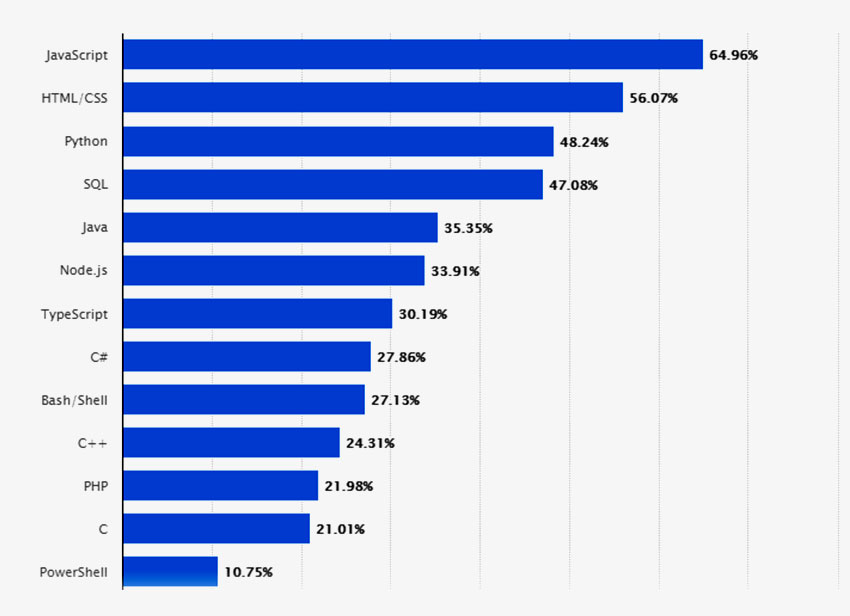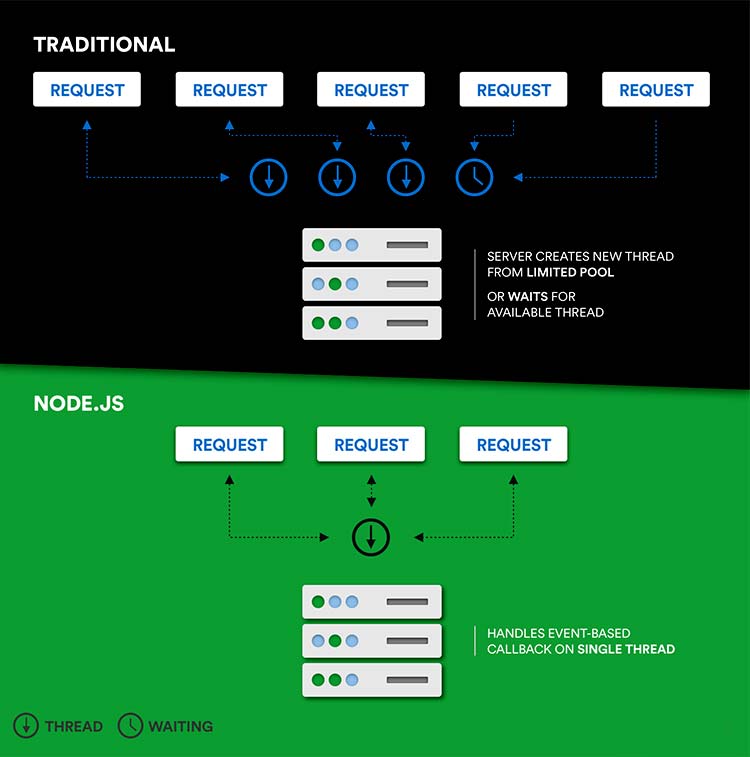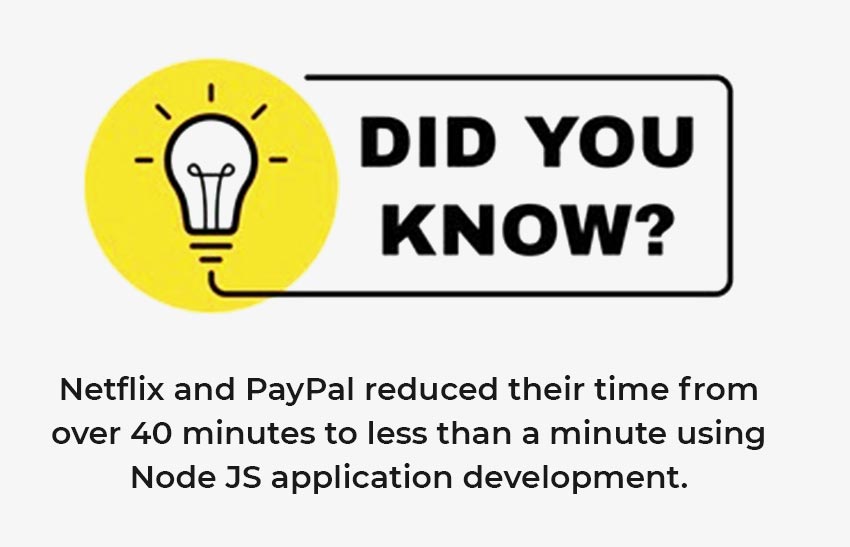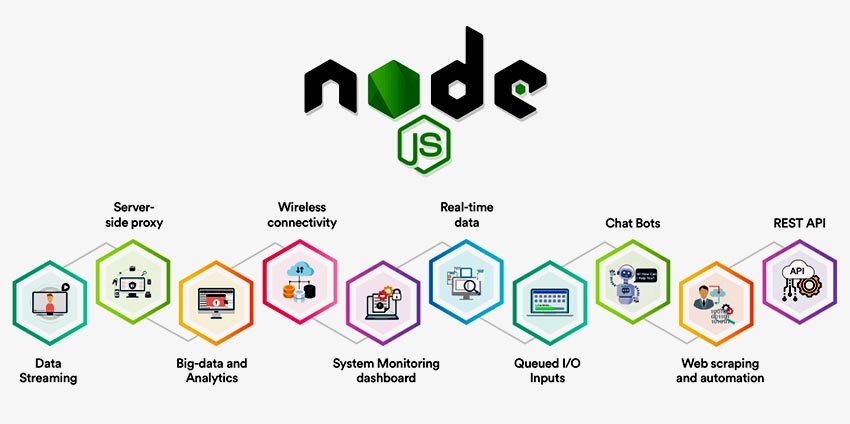
Developing a good product requires strong backing by technologies. In addition to its use in front-end development, JavaScript’s undefeated status as a leading client-side programming language has led to its evolution to become a powerful cross-platform app development tool.
The status of JavaScript being a widely-used programming language is confirmed because 67.7 percent of web developers choose it for web application development.

JavaScript’s share in web development
Node JS embodies JavaScript’s capabilities to transform the web app development scene. It is a popular name among web developers owing to its feature-packed status.
Having said that, what exactly is Node JS?
Node JS is an open-source JavaScript run-time environment that aids in server-side programming. In addition, the cross-platform JavaScript code facilitates the development of real-time network applications.
The Inception of Node JS
Node JS came into being in 2009 and was quoted as the “most exciting single piece of software in the JavaScript universe.” However, its popularity witnessed a stark rise in 2017 and has continued to maintain its pace since then.

Steep rise in the demand of Node JS in 2017
Node JS powers more than 20 million websites across the Internet. This number is quite impressive owing to the vast number of choices available to web developers today. Moreover, 37,000 out of 63,000 surveyed websites in the US-run on Node JS. It means that Node powers more than 6.3 million websites in the US alone.
Node JS’ features make it a preferred technology among developers. Let’s show you its inside-out picture.
Pros and Cons of Node.JS
Benefits of Node JS Web App Development
With so many choices available today, let’s analyze the reasons for Node JS’ popularity.
Scalability
Developers often need to carry out complex actions to add features to an existing app. With Node JS, scaling the application horizontally or vertically becomes relatively easy. Node JS developers can do this by adding nodes to the available system. Not only this, the platform creates the opportunity to add more resources to each node for vertical scaling.
High Speed and Event-based Model
Node’s asynchronous programming and non-blocking nature empower it to carry out minor tasks in the background without affecting the core thread. In addition to this single-threaded event-based loop, the Google V8 engine it uses is the quickest JavaScript engine. It deploys the JavaScript code into machine code, creating room for fast processing.

How Node Js handles requests
Node’s reliability on single-threaded event-based asynchronous programming model aids in updating data in real-time, which is a prerequisite for video chats, messaging programs, prerequisites, and online games.
Used as a Single Programming Language
Writing the server-side applications in JavaScript gives Node JS developers the chance to use the same language on the front-end and back-end, giving it the status of full-stack. Due to this, they don’t need to use an additional server-side programming language. Thus, it simplifies the deployment of web applications. Also, it means that there is no need to hire a different developer for the front-end and back-end.
Reputation for Improving Performance
Giants like Walmart, Amazon, Netflix, LinkedIn, eBay, PayPal, Uber, NASA, and Tumblr use Node JS, which is an impressive feat in itself.

Big Active Community Support
The vast community backing Node makes it a big yes for the developers. If developers get stuck with an issue at any point in time, they can deal with it with the help of Node’s active community that comprises thousands of programmers worldwide. It essentially means that a developer can get an open JavaScript source code for any web application development need.
Cons of Node JS Web Application Development
Like every technology, Node JS development comes with a few disadvantages. Let’s acquaint you with them to simplify your decision-making ordeal.
Lack of Stable API
Several changes in the JavaScript code bases are not compatible with the previous versions of Node JS. It means that Node JS developers have to make several changes in the code to ensure that it is consistent with the latest version.
Not Suitable for CPU-bound Tasks
When Node receives a CPU-bound task, i.e., when the event loop receives a heavy request, Node JS assigns the available CPU to process it on priority, followed by the other queued-up requests. Thus, it leads to overall delayed processing affecting the single-threaded event loop.
The Callback Hell Issue
A callback is a function that is performed after the completion of a task. Running too many callbacks in the background can cause their intertwining. Unclean codes or bad code structures add to the asynchronous programming to propagate it.
Now that you are acquainted with the pros and cons of Node JS development, let’s help you understand more about Node JS application development and where it stands compared to its counterparts.
Is Node JS a framework?
No. Although many people call it a framework. Technically, it is neither a framework nor a programming language but an open-source JS run-time environment based on the asynchronous programming model. It helps in executing JavaScript code outside a browser.

The memory consumption of Node JS over time
Is node JS and JavaScript the same?
JavaScript is a widely-used programming language that gives behavior to web pages. However, JS code is primarily used for the client-side activity. It is a platform that has extended the application of JavaScript code to server side-activity to make it a programming language that can be used both at the front-end and back-end.
Node JS and Its Counterparts
Node JS vs. Ruby on Rails
The freedom that Node JS offers to develop web applications and software is commendable. On these grounds, this full-stack JS gets the upper hand on Ruby on Rails when specific guidelines are imposed. Moreover, it means that you can start building everything from scratch while developing an app.
Additionally, Node JS’ option of non-blocking I/O systems and V8 engine aid in simultaneously processing several requests leading to faster functioning.

Daily download statistics of different versions of Node JS
Node JS vs. Python- Which one is better for web development?
Python is a high-level programming language. In contrast, Node JS is a run-time environment. Both of them are open-source.

The implications of Node JS
Node surpasses Python in terms of speed, thanks to its V8 engine. As a result of this, web applications created using Python are slower than those using Node JS. Also, Node is a hands-down winner in terms of the scalability of applications.
When should Node JS be used?
Now that you have ample knowledge of Node JS and are considering using it for your next web application development project, let’s help you understand some of the situations where Node JS development acts as the best fit.
- Multiplayer gaming apps
Quick responses are ideal for communicating with other players and running complex functions.
- Messaging apps
They are light in weight and yet demand versatility, best offered by Node JS.
- Collaboration tools
Platforms that require streaming are the best fit for leveraging Node JS’ benefits.
- Entertainment/Healthcare apps
Node JS development is ideal for apps that have several offerings and user profiles.
What’s there for Node JS in the future?
With giants making it a foundation of their online presence, the future of this popular JavaScript framework is bright. According to research, its downloads crossed the astounding 1-billion-mark back in 2018. Moreover, its single-threaded event model makes way for flexibility, scalability, and top-notch performance, attributing it as a full-stack JS platform that more enterprises will adopt in the future.
If you have made up your mind to leverage Node JS’ power for your next web application development venture, entrust this critical task to Brainvire, a renowned Node JS development company with two decades of experience in successfully serving clients.
Related Articles
-
Node JS vs Deno: Find Your Perfect Solution for Mobile Banking App
Deno is an emerging orb on the JavaScript realm and individuals assume that it will stamp out Node.js. However, when it comes to the finance industry, you need money management
-
Node.js Architecture: Effectively Build Spectrum of Scalable Apps
Talking About Node.js Architecture: Effectively Build Spectrum of Scalable Apps , It doesn’t make any sense that we select ‘The Best’ development framework for our business requirement. Rather, we go
-
What Everyone Ought To Know About Node.JS Based Finance App Development?
Talking About What Everyone Ought To Know About Node.JS Based Finance App Development, Technology is rapidly evolving across the globe. Every now and then, new software of technology is being



